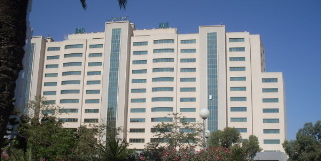After nearly a decade of operating in Tunis, the headquarters of the African Development Bank (AfDB) has finalized plans to return to Côte d’Ivoire, raising questions about the effect the relocation will have on Tunisia.
The AfDB is a multilateral development finance institution consisting of 77 African and non-African countries which funds a variety of public and private projects throughout the continent.
The AfDB moved to Tunis in 2003 due to civil war in Côte d’Ivoire. While its eventual return to the capital Abidjan has been official policy, the May announcement by the AfDB’s president that the relocation would be finalized by November 2014 was the first clear public statement that the change would come soon.
Related articles:
- IMF Loan Finalized After Months of Delays and Debate
- Tunisians Hope for Greater Engagement with African Union
- African Development Bank Seeks Socio-Economic Stability in Tunisia
The move is contingent on fulfilling conditions in Abidjan, however.
“The movement of staff will be in a phased and orderly manner… The move is conditioned on satisfactory progress in meeting a set of triggers in 5 key areas, including housing, office infrastructure, and education,” Magatte Wade of the AfDB’s External Relations and Communications Unit told Tunisia Live.
The Tunisian government appears not to have attempted to retain the AfDB headquarters in Tunis.
“We didn’t try to persuade the Bank to stay,” said Chokri Mahjoub, head of press relations at the Ministry of Development and International Cooperation. “It was mentioned in the Bank’s charter that the headquarters was in Côte d’Ivoire, and the [Tunisian] government did not try to influence it.”
According to the Ministry of Development and International Cooperation, Tunis will host a bureau in charge of regional coordination between the Abidjan headquarters and Maghreb countries. The AfDB has not released any details, but has said only that it will continue to have a presence in Tunis through the bureau.
There are currently 198 Tunisian staff working at the AfDB, and they will be allowed to retain their jobs if they relocate to Abidjan. This policy will apply to all the roughly 1,500 employees currently based in Tunis, regardless of nationality.
None of the staff have relocated so far, but the first are expected to move to Abidjan in the fourth quarter of this year, said Magatte.
Mahjoub claimed the departure of AfDBemployees from Tunis would not have any effect on the local economy. “This has nothing to do with the economy of Tunisia,” he said. “The Bank is not funding Tunisia.”
He also denied that the departure of the AfDB would decrease the international prestige of the country.
“It was known from the beginning that the real headquarters of the Bank is in Côte d’Ivoire,” Mahjoub said. He added that the decision to move back was initially made during 2009 and 2010, but the AfDB needed time to finalize arrangements.
A document addressing details of the move has been approved by the AfDB’s board of governors, but has not been made public.
Some bank employees have complained of being poorly treated by locals in Tunis, according to the Financial Times. The 2012 incident at the U.S. embassy in Tunisia has increased security concerns about operating in the country.
The AfDB gave a positive assessment of its temporary home in Tunisia.
“The Bank cannot express its gratitude enough to the Tunisian people and government for their exceptional hospitality during our period of temporary relocation in Tunis,” Magatte said.
– Doing Business in Africa



Comment here
You must be logged in to post a comment.